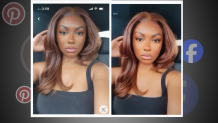From pop stars to our president, we’ve recently seen manipulated pictures and recordings of the famous online.
But it just as easily can happen to you.
Just ask a New Britain woman.
Alexis Austin says she posted a picture of herself on Pinterest in May.
Get Connecticut local news, weather forecasts and entertainment stories to your inbox. Sign up for NBC Connecticut newsletters.
Then in October, a friend flagged a Facebook video in which a business owner claimed that he created an image using artificial intelligence that Austin says looks exactly like her photo.
The business owner, Micah Berkley, says in the video on his Facebook page "Micah Berkley - Business Solutions Architect," “She’s gorgeous. She’s beautiful. She’s not real. I sculpted her. I carved her. I made her myself.”
Here are the two images side by side.

“It’s hard to deny [it’s not me] when you’re showing my face,” said Austin.
Local
Berkley’s post tells viewers that he could use a virtual influencer like this one to make money.
In other posts, he says he could teach you to do the same if you signed up for his class for a fee.
Austin warned her followers on TikTok on Oct. 25, “So he says he created and grafted me from scratch, which he didn’t. He stole a picture and you guys are signing up for his masterclass. What do you think he’s going to teach you to do?”
She reached out to NBC CT Responds to share her story, too.
“I did not give him permission to do this. I don’t know him; he doesn’t know me,” she said.
Austin uses social media to promote her side business, selling customized wigs, so she’s worried about the impact of this on her bottom line.
“I don’t have a huge following, but if it does grow are people going to second guess my authenticity? [And] who I actually am?” she said. “I am a real person, but now people are going to think, ‘She’s not a real person.’”
Berkley told NBC CT Responds in part, “we utilize publicly availably images from sources like Google Images and Pinterest to train our AI tools.”
He added, that this is standard practice in our industry “and is executed with a high level of integrity and respect for intellectual property laws.”
Austin’s lawyer, Paula Brillson, is an intellectual property and social media lawyer.
“The fact that you posted a photo does not mean anyone can take it. That is a common misconception,” said Brillson, the managing attorney of New York-based Digital Law Group.
She told NBC CT Responds that while copyright laws protect people from misappropriating our image, there are big gaps in our laws.
“Where the laws are lagging from technology is what happens if someone takes your image and digitally alters it, so it’s not exactly like you?” Brillson added.
Austin says she took a screenshot of his Facebook page that looks like the business owner put her picture on a dating app to make money.
And in the previously mentioned video, she says it appears he used AI to transform her picture into an old-school yearbook photo.
Berkley says, “our preliminary review found no evidence of monetization or use of likeness in the manner described.”
He calls Austin’s allegations “baseless.”
His full statement is below.
Austin says she is pursuing legal action.
Some of us have been posting online for two decades, since the dawn of Facebook, but putting ourselves out there so publicly comes with risks.
There are more reports about people’s images and voices being used and even manipulated.
“Knowing that, the more you put out there, the more realistic your deepfakes or clones can become,” said Vahid Behzadan, a University of New Haven assistant professor of computer science and data science.
Behzadan is currently teaching an AI and cybersecurity class for grad students.
He’s also on a task force that will help Connecticut lawmakers regulate these emerging technologies.
“We want to make sure the message that you’re listening to is authentic and authenticated,” he said, pushing consumers to ask their lawmakers to put appropriate protections in place.
But while we wait for legislation to catch up with the times, Brillson urges consumers to be proactive to protect themselves.
Most importantly, she says, is to set your social media accounts to private.
“That’s really the best advice I can give people who have children and people who are just using it for recreational purposes,” she said.
But if you’re posting content online to promote a business, like Austin, that’s not always an option.
So Brillson suggests including a watermark on your images or videos, uploading lower-resolution photos that won’t transfer well if stolen, and copyrighting your images too.
Specifically, she says, to file a copyright of your profile picture because she says thieves tend to be lazy and grab that image first.
Austin says she's registering her images with the U.S. Copyright Office ASAP.
“I don’t want this to happen to other people because it can be a lot worse than what it was for me,” she said.



